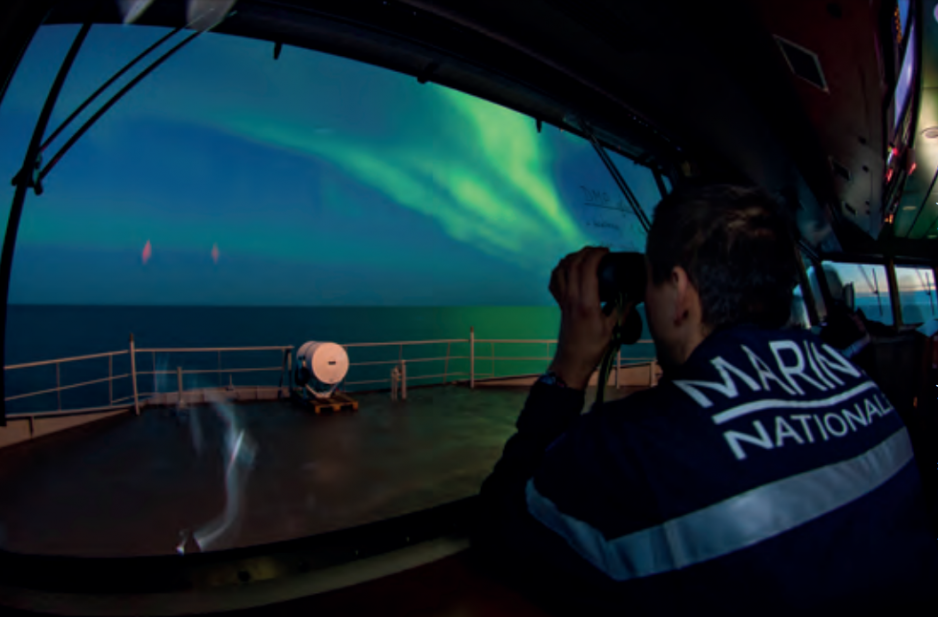You Discipline the One You Love

Picture from the French defense strategy for the Arctic. Photo: Jonathan Bellenand/Marine nationale/Défense
Rome: Living in the Arctic is kind of like being the most popular girl or boy in class, yet also the one to be chastised the most by the classmates. – The Lord disciplines the ones he loves, as it says in Hebrews.
I have written earlier about how the Ministry of Local Government and Modernization prepares the government’s upcoming High North whitepaper by sending consultancy companies from Bergen up north to discover. I do not know much about the outcome of that, so far. Except that their catching tools consist of poorly prepared case files, to say the least.
Chasing reality
The government ministries are not the only ones who chase the Arctic reality.
We are currently flooded with Arctic strategies from European countries. In just a short period of time, High North News has provided you with thorough insights into the German, the French and the Scottish approach to those of us who live here.
These are documents that, if realized, will have deep consequences for our politics and our everyday life. The debate about their contents is nevertheless almost absent, despite Norway’s defining the High North as its key strategic area.
Not on the agenda
But then again, Norwegian media and politicians on elections cannot fit too many debates into their agendas. Being a strategically important area does not equal being on the agenda. The strongest engagement comes from our military leaders and those concerned with security politics, even though the consequences of the various strategies are far bigger than just purely military.
The strategies share a set of common traits. First and foremost; they come from non-Arctic states that nevertheless want to take a position in the Arctic.
China defines its role as a near-Arctic state, while Scotland introduces a new term coining itself a “key near Arctic state”. The terms, which are met with somewhat vivid protests from Arctic states, reveal a strong desire about influencing the development in the High North.
Though desire is a rather mild term. Several of these strategies more or less demand a supranational management of the Arctic states.
I often participate in international debates about the High North, most recently here in Rome. I sometimes find myself wondering how Russian Foreign Minister Sergey Lavrov or, for that matter, US President Donald Trump, would respond to a German requirement about protecting areas in Siberia or Alaska.
Trump speaks about himself
Though, I do not really wonder.
Sergey Lavrov would authoritatively overhear the issue, whereas Donald Trump – regardless of what question he is presented with – would respond by talking about himself, his only are of interest.
Nevertheless, the question about wanting to intrude onto Arctic states’ sovereignty is raised with increasing strength.
It is raised because parts of Europe wants to keep the Arctic more or less untouched, and because European heads of state do not manage to realize how vastly different the various parts of the Arctic are. This “care” for the Arctic makes us the most popular kids in class.
And then we are chastised, because the same European countries believe that we are not able to understand the effect of climate changes to Arctic nature and Arctic people.
In addition, increased military tension has reinforced European involvement in the High North.
And as there are few, if any, who dare challenge Russia and the USA in matters of sovereignty, it is in particular the Nordic part of the Arctic that is subject to this schizophrenic pressure from European states.
The most important measures
There is no doubt that international agreements are required to face climate threats, however, through their various Arctic strategies some European countries do not only contribute to undermining national sovereignty, they by and large turn international frameworks upside down.
The most important measures, the measures that if taken could limit temperature increase in the Arctic, must be taken outside the Arctic. The Arctic takes the hardest hits from climate changes, however, its main cause is found elsewhere; not in the Arctic, but rather in Central Europe.
It means that both German and France, or the EU as an organization, already have the authority, or sovereignty if you will, to do something about the northern climate threat.
It does not mean we should not take emissions in the Arctic seriously; it just means that if the European concern for the Arctic is genuine, these countries have to take measures in their own back yards.
If this had not been such a serious matter, I would have said it was comical to see how cars fill the streets of Rome while they raise their voice about protecting parts of Northern Norway.
The hired consultants of the Ministry of Trade, Industry and Fisheries as well as their European counterparts do not have much in common except for this one thing: They struggle to take us who live in the High North seriously.
And that is serious enough in and of itself.
This op-ed was originally published in Norwegian and has been translated by HNN's Elisabeth Bergquist.

